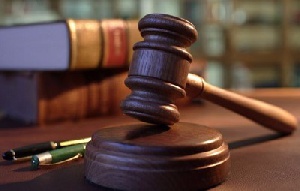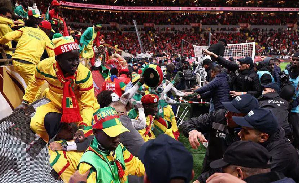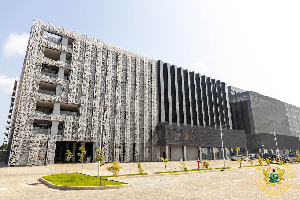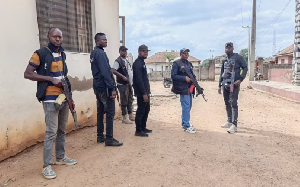Nana Ofori Atta Ayim: “DR. DANQUAH WAS A PROTÉGÉ OF THE CELEBRATED AND ICONIC GOD-FATHER OF WEST AFRICAN NATIONALISM AND THE PIONEER PAN-AFRICANIST, JOSEPH EPHRAIM CASELY-HAYFORD. IN HIS [DANQUAH’S] OWN WORDS, IT WAS AT THE FEET OF THE EMINENT NATIONALIST, ‘EKRA AGYEMAN, OTHERWISE KNOWN AS JOSEPH EPHRAIM CASELY HAYFORD, THAT I WAS BROUGHT UP, LIKE ST. PAUL UNDER GAMALIEL, AND IT WAS FROM EKRA AGYEMAN THAT I LEARNED SELFLESS POLITICS AS THE SACRIFICING OF ONE’S SELF TOTALITY FOR ONE’S OWN COUNTRY. I SAT UNDER HIS FEET FROM 1915 TO HIS OWN DEATH IN 1930.’”
Danquah was no nationalist, and therefore Casely-Hayford’s mentorship went to waste. Was it not the same Danquah who wept in prison in the wake of the February 1948 uprising “when Governor Creasy on March 12, 1948, issued Removal Order for the arrest and imprisonment of the six executive members of the UGCC”? (see Kwame Botwe-Asamoah’s “Kwame Nkrumah: The One and Only Founding Father (11)).
In 1939, he and Nana Ofori Atta 1 used their connections with the Colonial Government to deport Nnamdi Azikiwe from the Gold Coast (Note: Nnamdi Azikiwe reminded Nkrumah of this incident when the latter visited Nigeria in 1959). As well, he hated the immigrant Krobo, Ewe, Kwahu, Juaben, Northern, and Akwapem people of Akyem Abuakwa; and his selfishness compelled him to exclude Wallace Johnson’s Youth League, the Aborigines’ Rights Protection Society (ARPS) under Kobina Sekyi’s leadership, and the littoral intelligentsia from the Gold Coast Youth Congress!
Which nationalist behaves this way? Thus Danquah should be seen at best as a Machiavellian political sissy and at worst, as a heartless fifth columnist!
We therefore argue that Danquah did not want the premiership and presidency of the country, the Gold Coast and later Ghana, for if he genuinely did want them he would have worked harder at their realization rather than wait upon Nkrumah’s return to the Gold Coast.
He [Danquah] would then not have waited for Nkrumah to come down to the Gold Coast and do the dirty work for him and his selfish and elitist clique of Black Englishmen!
What if Nkrumah had rejected George Padmore’s and the West African National Secretariat’s urging to accept the General Secretaryship of the UGCC?
For one thing, Danquah and the other members of the UGGC’s Black Englishmen had no clue what to do with the UGCC, as the Watson Commission Reports notes: “FROM THE INTERNAL MINUTES EVIDENCE OF MINUTE BOOK OF THE WORKING COMMITTEE, THE CONVENTION DID NOT REALLY GET DOWN TO BUSINESS UNTIL THE ARRIVAL OF MR. KWAME NKRUMAH ON 16 TH DECEMBER, 1947, AND HIS ASSUMPTION OF THE POST AS SECRETARY.”
In fact, the Black Englishmen of the UGCC were not ready by 1947, 1951, 1954, 1956, 1957, and 1960…and would not be by the time Busia and his Progress Party assumed the reins of government from his client, the National Liberation Council, barely three years after the toppling of Nkrumah and his CPP government. This may have been what the Black Englishmen meant by “self-government in the shortest possible time”!
Yet Danquah, unlike the visionary Nkrumah, never led or founded any known major political party or political movement with mass following in his entire life, since he had no ideological direction to lead the Gold Coast and lacked expertise in mass mobilization and resource mobilization.
Four examples are his co-founder statuses with the United Gold Coast Conversion (UGCC), his associations with Busia’s Ghana Congress Party, Okyeame Akoto Baffour’s/Busia’s ethnocentric, secessionist and terrorist National Liberation Movement (NLM), and the Gold Coast Youth Congress (GGYC), which Casely-Hayford, Ofori Atta I, Frederick Nanka-Bruce and others initiated (Of course Danquah was a member of the Central National Executive Council of the NLM; we also do not whether Danquah was the founder of Akim Abuakwa Youth Association (AAYA), with which he has often been identified as its leader).
Danquah could not have founded or led any of these organizations because of his distaste for the people, of whom he said: “I don’t like this thing of the masses. There are only individuals for me.” And then dismissed their aspirations as “emotion.”
Prof. Richard Yidana explains: “THE LETTERS [Danquah’s] ARE ESPECIALLY REVEALING OF ITS VIEWPOINT THAT THE CRITICAL MASSES ARE TUMULTUOUS IRRESPECTIVE OF WHETHER OR NOT THEIR ACTIONS ARE LEGITIMATE…HE [Danquah] THEREFORE SOUGHT TO DISSOCIATE THE MODERATELY LIBERAL LEANING UGCC AND ITS LEADERSHIP FROM ANY POLITICAL ACT THAT COULD POTENTIALLY SEND THE WRONG MESSAGE TO THE COLONIAL OFFICE IN BRITAIN.”
What is more, Danquah never endorsed multi-party or inclusive politics, and derogatively referred to the citizens of the then-Northern Territories as “ntafo” when Nkrumah made J.A. Braimah a member of his cabinet. Of course, there is no doubt that Danquah’s position as one of the Vice Presidents of the UGCC contributed to the party’s dwindling electoral fortunes. For instance, after the 1951 elections the Working Committee of the UGCC passed a vote of no confidence in his leadership.
Accordingly, Danquah was relieved of the position of Vice President and his official UGCC function of accompanying and introducing Nkrumah at rallies came to an abrupt end. Danquah deserved nothing more than this gracious exit from the UGCC. His vice presidency came to an abrupt end never to resurrect.
What is not probably generally known is that Danquah’s election to the Legislative Assembly in 1951 came about not through popular vote but through the backdoor, the municipal election. In spite of Ofori Atta 11’s stern warning to the Akyem Abuakwa State Council not for any royal member of the Kyebi dynasty and stool heir to electorally root for the CPP, and in spite of the Akyem Abuakwa State’s resource mobilization for Danquah and the administering of Okyeman’s great oath to 140 chiefs to affirm their allegiance to Danquah, he still lost the 1956 general election to his nephew, Aaron Ofori Atta! Perhaps not surprisingly, the people of Akyem Abuakwa Central Constituency had rejected him previously in the 1954 general election.
Aaron Ofori Atta had also defeated him previously in 1954.
To those who are wont to hide Danquah’s political mediocrity behind the opaque curtain of education, why did his University of London’s doctoral degree not win him elections and independence for the Gold Coast? Actually, what did he and the other members of the Black Englishmen clique needed Nkrumah’s bachelor’s and master’s degrees for, to help them make the UGCC institutionally function? Among other things, though, not even Mabel Dove Danquah, Danquah’s former wife, cared enough to join his campaign or political platform. Instead, Mabel jumped ship and joined Nkrumah’s progressive train toward the destination of independence.
But then again, why Danquah and Busia pressed for political regionalism or federalism stemmed from the fact that, if they could not be presidents or prime ministers in the capital city, at least they could accept the possibility of settling for presidency and prime ministership in their secluded villages of political and social elitism! This was how low their doctoral degrees, Oxford and University of London education sunk them: Mediocrity, secessionism, and ethnocentrism!
The people of Akyem Abuakwa Central, Danquah’s constituency, would rather vote for his nephew Aaron Ofori-Atta, who became a Minister for Local Government and a Minister for Justice in the CPP government. Is it any wonder that Danquah could not secure the services of his nephew (Minister for Justice and Minister for Local Government) to plead his case when he was justifiably detained under the PDA for plotting to overthrow Nkrumah? And more than all the above, there is enough evidence in Ghana’s political history to show that not only was Danquah ill-prepared to lead and govern Ghana, but that he also was not qualified to fill those capacities, the premiership and presidency.
Further, if Danquah could not win a simple parliamentary sit, on what basis did he expect to have been elected the premier and president of Ghana? But Nkrumah saved his dwindling career by making him the Director of Legal Education in Ghana as well as a member of the Ghana Arts and Sciences.
This generous gesture from Nkrumah was not enough to appease him. Rather, Danquah went on to seal a close working relationship with the CIA. This information has come to light because William P. Mahoney, the American Ambassador to Ghana at the time, revealed to the world the clandestine collaboration through his son, Richard Mahoney.
Turned out, after Nkrumah had pardoned him and other detainees on June 2, 1962, Danquah went to the American Embassy and to ask “why the funds his family had been receiving during his imprisonment had been cut after his release…This caused Mr. Mahoney, the new US Ambassador to Ghana to summon the CIA chief of station to ask why he had not been advised of the agency’s association with Danquah…Mahoney flew to Washington two days later and personally informed Kennedy about the matter” (see Dr. Botwe-Asamoah’s “Fallacies of J.B. Danquah’s Heroic Legacy (V); see also Mahoney’s “JFK: Ordeal in Africa”).
We should want to make it clear that this was not the first time that Danquah, an agent and darling of imperialists and colonialists, had been involved in a scandal of this magnitude, a scandal bordering on subversion, betrayal, greed, and sabotage. In 1934, for instance, when the Provincial Council of Chiefs dispatched a “committee of citizens” to London to petition the Colonial Government against the Sedition and Water Bill, Danquah, in his capacity as a Secretary of the delegation, used the occasion to undermine the Aborigines’ Rights Protection Society (ARPS).
More to the point, the intentions of Nana Ofori Atta 1 and his Attorney General Danquah to undermine the NCBWA in 1934 failed, as the latter did not want to entertain any encumbrance in his way, just as he interpreted Nkrumah’s massive popularity as a potential threat to the realization of his political ambition. Danquah and Nana Ofori Atta 1 undermined the National Congress of British West Africa (NCBWA) in addition to the ARPS. In yet another instance, Governor Gordon Guggisberg dispatched Nana Ofori Atta to London to denounce the NCBWA.
Danquah’s designated role as an agent and darling of colonialists and imperialists is captured in the following statement: “I AM SOMETIMES MUCH SURPRISED WHEN I SEE MANY OF MY COUNTRYMEN TERRIFIED BY THE USE OF THE WORD, ‘SELF-GOVERNMENT.’ THEY ARE TERRIFIED OF IT BECAUSE THEY THINK IT MEANS THE DESIRE TO BREAK AWAY FROM THE [BRITISH] EMPIRE AND BECOME INDEPENDENT OF THE BRITISH. IF IT COMES TO THAT, IF IT COMES TO A DECISION TO BREAK AWAY FROM THE BRITISH CONNECTION, I WOULD BE THE LAST [PERSON] TO EXPRESS SUCH A TERRIFIC WISH” (see the Historic Speeches of J.B. Danquah).
What then did Danquah and his clique of Black Englishmen mean when they preached “self-government within the shortest possible time”? What are the words “possible” and “shortest” time doing there in their political sermonizing? Did Danquah’s telegram to the Secretary of State for the Colonies in respect of the afore-referenced February 28, 1948 uprising not end with the words “GOD SAVE THE [BRITISH] KING”? Thus, it should not come as a surprise to anyone that Danquah should see Apartheid South Africa as “THE FIRST FREE COLONIAL COUNTRY IN AFRICA” (see “Danquah Was A Nothing But An Imperial Stooge,” Nana Akyea Mensah,” Ghanaweb, Oct. 3, 2010).
Mr. Mensah quotes Danquah: “The 1887 Bill never became a delegation of the Aborigines Rights Protection Society was sent from Cape Coast to the Colonial office against it, and because Joseph Chamberlain, the Colonial Secretary, explained to the Queen that the delegation had come from the Gold Coast in West Africa notorious as the land of the mosquito and the White Man’s Grave. Said Queen Victoria to Joseph Chamberlain: ‘Tell my people of the Gold Coast, what I want is their loyalty, not their lands. IT WAS THIS ANSWER WHICH SAVED GHANA FROM BECOMING A SECOND KENYA AND WHICH ALSO MADE IT EASY FOR GHANA TO LEAD SUCCESSFULLY IN THE LIBERATION OF AFRICA AND TO BECOME THE FIRST FREE COLONIAL COUNTRY IN AFRICA, (APART FROM SOUTH AFRICA)-BY DR. DANQUAH” (our emphasis).
Danquah, it seems, was crediting the leadership of the Aborigines’ Rights Protection Society (ARPS), not himself, with laying the foundation for the Gold Coast’s decolonization! (Note: The constitutions of the ARPS and other such Gold Coast organizations drew upon the national constitutions of Liberia and Sierra Leon). Supposedly Danquah recorded his observations on Apartheid South Africa on October 2, 1961, according to Mr. Mensah. But did Danquah ever come across the word “apartheid” and its political connotations?
Did Danquah mean independence for Boers or Black South Africans? Was it not in 1994 that Apartheid officially came to an end? And did Danquah not pass on in 1965?
Yet this was the same man who, on March 5, 1952, in the Legislative Assembly had opposed constitutional abolishment of the “Leader of Government Business” in favor of the “Office of Prime Minister.” Danquah had also supported the 1950 Coussey Constitution in its entirety, a document that did not recognize the people’s popular sovereignty and latently promoted the concept of Indirect Rule. Earlier in the 1930s, he had pushed for the establishment of an Office of Minister of Home Office for himself. But then again, his involvement in the cruel murder of Odikro Akyea Mensah nipped that agenda in the bud.
The above facts notwithstanding, Mr. Mensah asks: “If in the opinion of J.B. Danquah, Apartheid South Africa was the ‘first free Colonial country in Africa,’ what was exactly his vision of that freedom?..For the sake of brevity, I INVITE THE READER TO BEAR SUCH A BANKRUPT ORIENTATION WHICH WOULD LATER LEAD MANY A DANQUAH FOLLOWER TO CONSIDER MR. NELSON MANDELA AS A TERRORIST IN ACCORDANCE WITH THE WISHES OF THE COLONIAL OWNERS WHO INDOCTRINATED THEM” (our emphasis).
Obviously, Danquah did not know what was going around him to know for certain the status of Black South Africa was tied to the political fate of others on the continent! That is what should happen given that he and Ofori Atta colluded with the Colonial Government via the so-called Indirect Rule under which the two had created their own microcosm of “apartheid,” where the Ga, Ewe, Kwahu, Akwapim, and non-Akyem were consigned to second-class citizenship! That is also what happens when one stretches taut the Edmund Burke’s political ideology! Is it surprising for Danquah to denounce the 1948 uprising as “an act of treachery”?
On the other hand, if Mr. Mensah’s recollection of the historical material he attributes to Danquah and relied on to make his analysis is correct, how could a University of London’s doctoral degree holder, lawyer, politician, and historian claim Apartheid South Africa was “THE FIRST FREE COLONIAL COUNTRY IN AFRICA”?
Was Danquah’s historical amnesia borne out of his ignorance of Africa’s political realities any different from George W. Bush’s “AFRICA IS A NATION THAT SUFFERS FROM INCREDIBLE DISEASE”? True, Bush interchangeably referred to Africa as “a nation” and “a country” in a June 14, 2001 interview in Sweden (see John Cochran’s “Bush’s Big Trip: Why Africa? Why Now?” ABC NEWS, July 8, 2001).
And if South Africa was a “free country” in 1961, what was there for Danquah to fight for in the case of Ghana under Nkrumah whom he perceived as a dictator and, accordingly, wanted the masses that he hated so much to rise up against.
Danquah told African-American writer Richard Wright so in a 1954 interview. His contempt for Nkrumah is fully captured by Kofi Bentum Quatson, former National Security Coordinator.
Quatson writes: “Of course the opposition parties were not only disappointed. They were deeply hurt to the point of vengeful anger because all their grand ambitions for political power and all their dreams for gorgeous enjoyment had been shattered” (see “The Man Nkrumah: Those Who Betrayed Him”).
These accounts give one cause to question Danquah’s titular accolade as the “Doyen of Gold Coast Politics.”
How could an individual be titularly identified with a country when he could not win an election for a political party and himself and had to be disposed of after the 1951 elections? How can an individual be given a title identifiable with a country when he wept in prison because somebody’s vision and prescience [Nkrumah’s] called colonial authoritarianism into question?
What was “doyen” about Danquah, a House Negro, since he could not even correctly read the intentions of the imperialists and colonialists, his masters, whom he had servilely served with unblemished dedication?
We base the latter question on his failure to see in advance the measures the colonial authorities would institute against him (and the others) after the February 1948 uprising!
Nkrumah understood the psychology of colonialism and of colonialists and thus steeled himself against any eventuality, however draconian, including assassination or death. His was a mindset of the radical revolutionary! Indeed that titular assumption invested with Danquah was and still is suspect!
But Danquah would not be an agent and darling of the British Colonial Government for long.
His involvement with the ritual murderers (all his relatives) of his ritually murdered Odikro Akyea Mensah of Apedwa, also his relative, compelled the British Colonial authorities to distance themselves from him [Danquah]. Some scholars and commentators have cogently argued, speculated, and theorized that Odikro’s verbal threats to expose Danquah’s financial misappropriations vis-a-vis the coffers of the Akyem Abuakwa State after the death of Nana Ofori-Atta 1, may have given Danquah cause to collaborate with his relatives to murder Akyea Mensah to seal any possible accusations of “causing financial loss to the Akyem Abuakwa State” against him!
Odikro’s blood was used to blacken the ceremonial stool. Thereafter, his involvement with the scandalous case undermined his ability to obtain personal representation of trade unions, the Gold Coast Youth Congress, and farmers in the Legislative Council. It is a well-known fact that this infamous incident factored into popular electoral rejection of Danquah in Kibi and Akyem! This barbaric incident also destroyed the rapport he once shared with Governor Allen Burns and so became the bête noir of the Governor.
Relatedly, Dr. Botwe-Asamoah recounts an incident that took place in Osiem where men with “big clubs” assaulted employees of the Cocoa Services. According to him, blood poured out of the victims’ heads and faces. Some female Cocoa Services employees including Dr. Botwe-Asamoah’s own aunt were raped. The latte further notes: “Danquah had succeeded in convincing some people at Osiem to do his bidding” (see “Fallacies of J.B. Danquah’s Heroic Legacy (V)). It turned out Danquah wanted cocoa farmers to resist government’s policy of chopping down swollen-shoot trees and may have conspired with thugs in Osiem to exact vigilante justice on his would-be victims.
In addition, Danquah’s role together with Nana Ofori-Atta’s in the mistreatment of “immigrant tenants” or “strangers-immigrants,” including Kwahu traders, in their jurisdiction is well documented. In a 1927 letter “An Epistle To the Educated Youngman,” Danquah repeated Ofori Atta’s ethnocentric indictment of non-Akyem: “Mother Akim Abuakwa is being dismembered slice by slice like bread on a breakfast table…future generations might have to rent from strangers in their own ancestral land.”
Ofori Atta instructed his sub-kings to throw out from Akyem Abuakwa all those Kwahu traders who did not their own houses in the country. Thereafter, Kwahu traders were evicted from their stores. And yet Ofori Atta sanctioned those Akyem landlords who sympathized with the Kwahu victims of his economic apartheid policies. Nana Ofori-Atta secured the backing of the colonial government through the colonial police force to crush any opposition to his draconian and ethnocentric policies.
In some instances Ofori Atta employed the services of District Commissioner W.J. A. Jones to do his bidding. The colonial government’s police forces sporadically beat and arrested those protestors who challenged Nana Ofori Atta’s and Danquah’s draconian and ethnocentric policies. Danquah was complicit in all these!
Elsewhere Danquah, in a February 4, 1952 letter to one Seth Appiah of the Akim Abuakwa Youth Association), gloated over Akyem Abuakwa as “THE LARGEST STATE IN THE COLONY AND SO MUST ALSO BE THE GREATEST IN THE LAND,” “FEARED AND RESPECTED,” and “LOVED BY ALL”…”I AM DETERMINED TO HAVE THE ABUAKWA NAME REHABILITATED AND MAKE ABUAKWA LEAD THE NATION” (Danquah, Vol. 3, 1972).
Danquah also wrote the following: “PARTY POLITICS IS AN ALIEN POLITICAL FORM WHICH HAD CREATED CIVIL STRIFE AND VIOLENT DISSENSION BETWEEN FATHER AND SON.” Thus, “IF THE BRITISH SHOWED NO UNDERSTANDING, AKYEM ABUAKWA WOULD SECEDE FROM THE COUNTRY AS A SOVEREIGN AND INDEPENDENT STATE WITH THE ONLY RIVAL OF THE ASHANTI COUNTRY.”
It is often said that if one wants a model or excellent example of the brutality of Indirect Rule, total submission to the interests of the colonial enterprise, and native authoritarianism in Africa, then one had better look at Danquah and the Ofori-Attas and their records, their legacies!
We shall return…
Opinions of Monday, 20 April 2015
Columnist: Kwarteng, Francis














